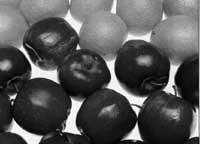Nutrition and Cancer
In the last years of history, human food has undergone major changes. They lived through hunting and fruit and in the twentieth century. Once they have lasted until the nineteenth century (the Kalahari, for example in the Bosquimans of the South African desert), gives us an unbeatable view of the current diet. In prehistoric countries living in a temperate climate, only 20% of the total calories were associated with fat (half of the current typical western diet). Of these, unsaturated fats were much more than saturated fats. Moreover, the fiber content was 45 g/day and not to the west of 15 g or less, and the consumption of ascorbic acid was 4 times higher than the current one.
If in human evolution we recognize that modern man (Homo sapiens sapiens) appeared 30-50,000 years ago, we can affirm that 90% of human history has been of low fat, abundant in fiber and rich in ascorbic acid.

Eating and eating habits changed, above all, for the Industrial Revolution (also living habits, 250 years ago). As fat intake increased, fiber intake decreased, and complex carbohydrates were replaced by refined sugars. As a consequence, the current man suffers a biological dephase: his physiology (Prehistoric) XX. The diet of the twentieth century is facing the diet.
As is attributed to the diet and sedentary life that people of today have a higher height, it is considered that people of today are overweight and chronic diseases (cardiovascular and the cancer itself) for the same reason.
Studies have shown that the development of certain tumors and the absence of others are related to feeding. Fats are related to the development of these tumors (breast, uterus, colon, rectum, prostate, and sand). Alcohols with mouthpiece and esophagus. Nitrates with esophagus and stomach. Minerals are considered as fibers, vitamins A, C and E, zinc and selenium, etc.
At present, and despite the lack of feeding measures to prevent cancer, epidemiological studies and experimental data show that low-fat diets, low alcohol consumption, moderate use of smoked products and the increase in the consumption of fruit and vegetables are good measures.
According to these studies, the adoption of these measures does not generate diseases and may be able to reduce the number of food-related cancers.
Buletina
Bidali zure helbide elektronikoa eta jaso asteroko buletina zure sarrera-ontzian











